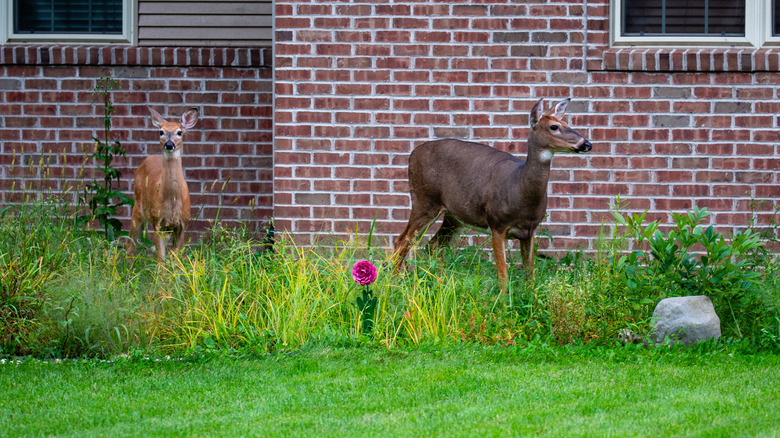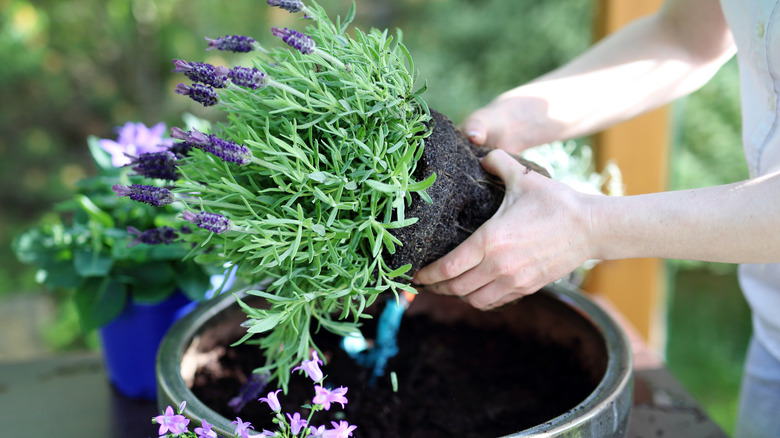The Natural Deer Repellent That's Already Sitting In Your Kitchen Cabinet
First thing in the morning when there's an early mist and the traffic is still light, you might peek out your window and see a couple of deer gently tiptoeing around the edge of your lawn, especially if your property is adjacent to the woods. They're elegant looking, and spotting them is a poetic start to your day. But then you remember how much damage they do to the garden and realize you probably need an effective deer repellent. The good news: You don't need to buy a chemical-laden commercial product that can be costly.
Deer cannot stand the scent or taste of cinnamon, so that will be a primary ingredient in your homemade deer repellent. That's important because, undeterred, they can and will decimate your vegetable garden, snack on your fruit trees, destroy ornamental foliage, crush flowers, and snap off branches, often cutting short the lifespan of sapling trees. In addition, they carry ticks, greatly increasing your and your dog's chances of getting Lyme disease. Consider taking additional steps to stop ticks from taking over your lawn too, like snipping your shrubs and keeping the lawn mowed.
How to make and use natural deer repellent from kitchen ingredients
We have a couple of chemical-free deer-repellent recipes for you to choose from, and you probably have most of these ingredients handy. For the first one from Talk Leisure, crack open two raw eggs and mix them together in a bowl. Add vegetable oil, cinnamon oil, hot sauce, milk, and dishwashing detergent, and then combine. To make it more sprayable, add water, mix it all together, and then pour it into a clean, empty spray bottle.
A second recipe from Borst Landscape and Design has more precise measurements, which you could use as a guideline for the first recipe if you prefer that one. In your bowl, you're going to mix together a teaspoon of dishwashing detergent, one tablespoon of cooking oil, and a cup of vinegar (white vinegar is a good choice). Gather three essential oils — cinnamon, peppermint, and clove — and add between ten and 20 drops of each. Make sure you use 100% real cinnamon oil and not cassia or oil that's artificially cinnamon-scented.
You might test a tiny area of your garden with one of your concoctions first to make sure the plants don't get damaged. Then you'll spray the surrounding foliage to keep the deer out. Don't spray it directly on vegetables, fruit, or anything you'd eat. You'll need to stay on top of reapplying the repellent every few days and after windy or rainy weather.
Other ways to repel deer
Using scents that deer don't like is an effective way to deter them from chomping their way through your garden. In addition to spraying foliage with your preferred formula, add plants that have an odor they don't enjoy. You might love lavender, but the deer won't, and most of us enjoy the scent and color of the blooms — this could be a win-win for your garden. A second option is to plant peppermint. They dislike it but meanwhile, you've got yourself an endless supply of herbal tea and mint jelly. Planting garlic could help dissuade them from visiting if you don't mind a light garlic scent in your garden. There are also many benefits to planting marigolds, one of them being that deer find the scent repulsive.
If you're okay with cordoning off your property or certain areas within it you might consider getting a mesh-like metal deer fence. Different types are available, but we like the idea of erecting a barrier that is the least visible or obstructive. Alternatively, if you have a dedicated and well-defined plot where you grow vegetables and you can make the investment, a cedar garden box with a built-in deer fence might be perfect.


